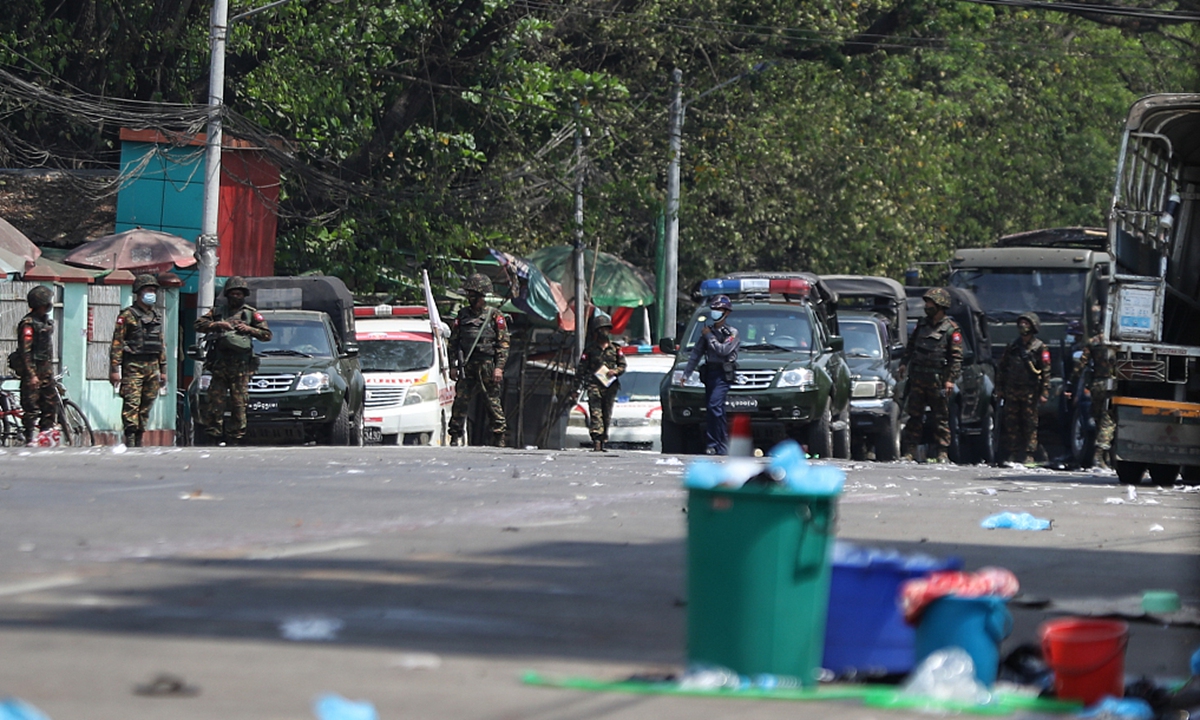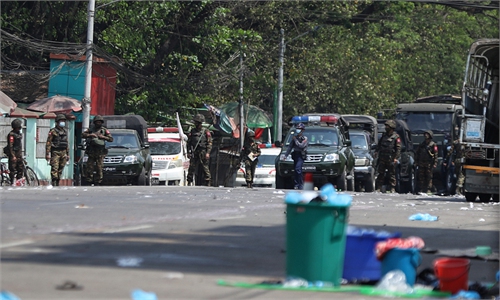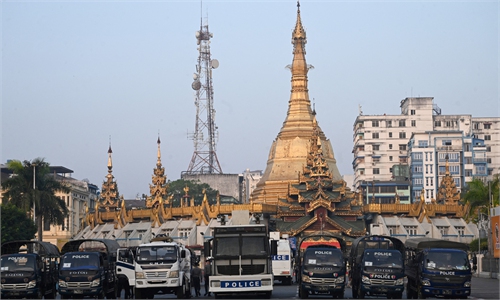IN-DEPTH / IN-DEPTH
BHRN and more West-funded Myanmar groups surface behind violent attacks on Chinese factories

Myanmar Photo:VCG
As the Chinese Embassy in Myanmar urged measures to stop violence and punish the perpetrators who smashed, looted and burnt Chinese-funded factories in Yangon, some "NGOs," such as the Burma Human Rights Network (BHRN), acting in the name of human rights protection and supported by Western forces, put the Chinese companies and staff in danger of violence for their political purposes.Calls for violence against Chinese properties including the factories, had appeared on social media .
Kyaw Win, founder of the London-based BHRN, said on a tweet on Friday: "A warning to the Fascist Junta. If one civilian killed one Chinese factory become ashes."
Kyaw Win's tweet was retweeted on the same day by the account of the Milk Tea Alliance, a loose online coalition of people mostly from regions including Hong Kong and Taiwan, who attack the Chinese mainland on social media, saying "if one civilian in Hlaing Thar Yar is killed, one Chinese factory will become ashes, do you agree?"??
Their twisted logic behind the sensational threat is that they want people to believe that the latest Myanmar political reshuffle was supported by China.
The radical groups, including BHRN and Milk Tea Alliance, play an important role in tarnishing China's relations with Myanmar and falsely claiming that China intervened in Myanmar's cabinet reshuffle.
Amid political upheaval in Myanmar, BHRN has created a flurry of rumors attacking China across social media.
China has made it clear for many times that it hopes Myanmar can properly handle its internal disputes and respect the constitution to resolve its internal problems.?But Kyaw Win and his followers turned a blind eye to these remarks.
Kyaw Win even incorrectly portrayed a Chinese-funded dam project in Kachin state, northern Myanmar, denouncing it in a tweet as part of China's support to the "fascist military."
The dam, which was signed back in 2001, has been suspended since 2007 due to the opposition by local forces to foreign investment projects, driven by nationalism and alleged environmental concerns.
Aung San Suu Kyi said in 2019 that an administration shouldn't terminate foreign-funded projects approved by its predecessor.
Kyaw Win has been a firm supporter and spreader of some widely circulated rumors, such as "Chinese aircraft transporting technicians to Myanmar." In a recent tweet, he said that "despite YGN Intl airport being closed, dubious flights from Kunming, China to Yangon have several flights. Chinese Ambassador said these flights carry seafood from China for the embassy. So, we change the name of Chinese embassy to 'seafood market'."
The BHRN is funded by the National Endowment for Democracy (NED), a veteran anti-China foundation financed by the US government.
NED is notorious for propagating anti-China propaganda and meddling in other countries' internal affairs. Funding for this self-proclaimed private, nonprofit organization, which largely comes from the US Congress, has long been funneled to secessionists in China's Hong Kong, Xinjiang, Tibet, and Taiwan regions, observers said.
In January, the BHRN urged the UK House of Commons to support the amendment to the Genocide Trade Bill, a proposal believed to target China and defame the Chinese government for alleged genocide against the Uygur population. The organization claimed it believes the proposed amendment would bring significant scrutiny and economic consequences to the "regimes" in Myanmar and China, who enjoy trade deals with the UK despite "genocidal campaigns" against the Rohingya and Uygur.
Observers say there is abundant reason to believe that the BHRN has worked with NED to publish a large number of China-related rumors or draw up information on various hot affairs, including conspiracy theories and anti-Chinese slogans, which is a common tactic used by some overseas anti-China NGOs.
"These US foundations often give money to Myanmar domestic organizations, maybe $100,000 or $200,000 each time," a scholar from Myanmar who preferred to remain anonymous told the Global Times in a previous interview. "The foundations are likely to utilize the organizations they sponsor to do some false propaganda, like what they might have done in Hong Kong."
Another organization that has stirred sentiments against China during Myanmar's political upheaval is "Justice for Myanmar."
Justice for Myanmar claimed in an earlier report that five Chinese companies have provided munitions to Myanmar.
Such a report was used by several overseas anti-China media as "evidence of China's support for the junta." However, experts believe China-Myanmar military ties and weapons trade is unlikely to be related to the current political situation.
In a recent feature article, Justice for Myanmar listed a few Chinese with locations in the Golden City, Yangon, a land reportedly controlled by the Myanmar army, in a bid to imply deeper business ties between those Chinese companies and Myanmar military, despite that they cannot provide any specific or clear evidence for the relation.
The Global Times learned that Justice for Myanmar was founded in 2020 as a self-proclaimed covert group of activists. It says its campaign aims to "pressure individual businesses and investors from countries around the world to divest from Myanmar military businesses."
One of the channels for spreading of its accusation is Radio Free Asia, a US-funded news agency created by the CIA during the Cold War to spew propaganda.
This disinformation campaign is not necessarily from inside Myanmar, but more like a familiar propaganda trick used by the West to smear China, which aims to deliberately frame China as the cause of the political event in Myanmar, according to observers.



